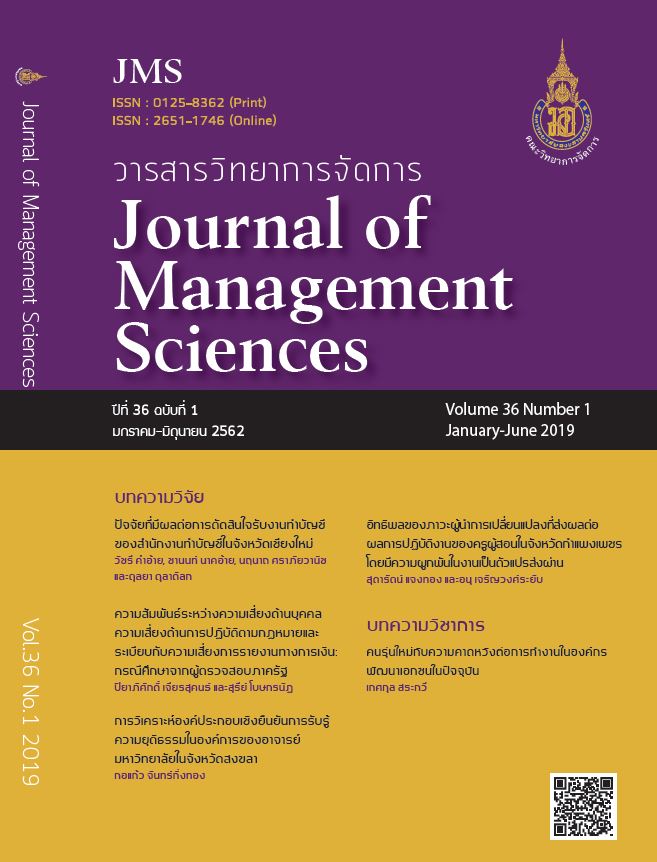The Influence of Transformational Leadership on Job Performance of Teachers in Kamphaengphet Province: The Mediating Role of Intrinsic Work Engagement
Main Article Content
Abstract
The purpose of this study is to examine the indirect influence of transformational leadership on job performance of teachers in Kamphaengphet Province, with work engagement as mediator. The participants of this study were 370 teachers in Kamphaengphet Province. Data were analyzed by using simple regression analysis. The results of the study indicated that some parts of transformational leadership have influenced on job performance of the teachers through significant work engagement. Findings of this research can be applied to improve transformational leadership among school administrators, which in turn, enhances job performance and work engagement of teachers.
Article Details

This work is licensed under a Creative Commons Attribution-NonCommercial-NoDerivatives 4.0 International License.
All published articles are SJMS’s copyright. The editorial board allows all published articles to be copied, excerpted, or disseminated with academic citation.
References
Baron, R. M., & Kenny, D. A. (1986). The moderator–mediator variable distinction in social psychological research: Conceptual, strategic, and statistical considerations. Journal of personality and social psychology, 51(6), 1173-1182.
Chaleekuae, T. (2016). Relationship between transformation leadership and work effectiveness practice of teacher under Rayong provincial office non-formal and informal education. Burapha University. Chon-Buri.
Chongvisal, R. (2000). The effect of transformational leadership training on Kasetsart University student leaders. Srinakharinwirot University. Bangkok. Government Teacher and Education Personnel Act, B.E. 2004
Judd, C. M., & Kenny, D. A. (1981). Process analysis: Estimating mediation in treatment evaluations. Evaluation review, 5(5), 602-619.
Kanthong, P. (2013). The relationships between motivation, transformational leadership and organizational commitment of employees: A case study Thai Wacoal public company limited. Ramkhamhaeng University, Bangkok.
Kuekulwong, T. (1987). Modern Education Administration: Theory of Research and Practice. Bangkok. : Wattan Phanit Printing Press Co.,Ltd.
Mackinnon, D. P. (2008). Introduction to statistical mediation analysis. New York: Erlbaum.
Maslach, C., Schaufeli, W. B., & Leiter, M. P. (2001). Job burnout. Annual review of psychology, 52(1), 397-422.
Ministry of Education. (1999). The Curriculum of the Early Childhood Education Curriculum, 1999. Bangkok: The Teachers' Council of Lat Phrao.
Pisitbunnakorn, N. (2014). Organization commitment and job performance of personnel of Bangkok area revenue office 22, Bangkok district. Kasetsart University. Bangkok.
Prasertsri, R. (2001). Leadership. Bangkok. : Thanathud Printing Co.,Ltd.
Rothbard, N.P. (2001). Enriching or Depleting? The Dynamics of Engagement in Work and Family Roles. Administrative Science Quarterty 46(4), 655-684.
Saks, A. M. (2006). Antecedents and consequences of employee engagement. Journal of managerial psychology, 21(7), 600-619.
Schaufeli, W. B., Salanova, M., Gonzalez-Roma. V., & Bakker, A. B. (2002). The measurement of engagement and burnout and: A confirmative analytic approach. Journal of Happiness Studies, 3(1), 71-92.
Schaufeli, W. B., & Bakker, A. B. (2004). Job demands, job resources, and their relationship with burnout and engagement: A multi-sample study. Journal of Organizational Behavior: The International Journal of Industrial, Occupational and Organizational Psychology and Behavior, 25(3), 293-315.
Schaufeli, W. B., & Van Rhenen, W. (2006). Over de rol van positieve en negatieve emoties bij het welbevinden
van managers: Een studie met de Job-related Affective Well-being Scale (JAWS)[About the role of positive and negative emotions in managers’ well-being: A study using the Job-related Affective Well-being Scale (JAWS)]. Gedrag & Organisatie, 19(4), 323-344.
Schaufeli, W. B., Bakker, A. B., & Salanova, M. (2006). The measurement of work engagement with a short questionnaire: A cross-national study. Educational and psychological measurement, 66(4), 701-716.
Schaufeli, W. B., & Salanova, M. (2007). Work engagement: An emerging psychological concept and its implications for organizations. In Research in Social Issues in Management (Volume 5): Managing social and ethical issues in organizations.Gilliland,S.W.; Steiner, D.D.;&Skarlicki, D.P.,editors.pp.135-77.Greenwich,CT: Information Age Publishers.
Schaufeli, W. B., & Bakker, A. B. (2010). The conceptualization and measurement of work engagement. In Work engagement: A handbook of essential theory and research. Bakker, A. B.; & Leiter, M. P., editors, 10-24. New York: Psychology Press.
Seekhao, A. (2012). The relationship between both Transformation leadership perception and quality of work life with organizational commitment of Kasikornbank public Company limited SME business division 1. Silpakorn University. Bangkok.
Senneewong na ayutthiya, J (2016). The effect of positive psychol capital and organization climate on service quality : The mediation role of work engagement. Srinakharinwirot University, Bangkok.
Supornpon, S. (2000). The relationship between training satisfaction and job performance of employees at the head of the Telephone Organization of Thailand plan. Kasetsart University. Bangkok.
Suteerawut, N. (2016). Effect of job autonomy positive psychological capital on job performance of bank employees : The mediating of intrinsic work motivation. Srinakharinwirot University, Bangkok.
Wong-Cheun, A. (2012). Effect of job commitment on job performance of SMEs accountants in the northeastern. Mahasarakham University. Mahasarakham.
Worawattanaparinya, S. (2013). The structural influence of perceived transformational leadership on the performance of private university lecturers. Ramkhamhaeng University. Bangkok.
Wuttisetkron, N. (2014). Canonical relationship between emotional quotient and teacher’s performance effectiveness in school under the office of Phitsanulok primary educational service area 2 Pibulsongkram Rajabhat University. Phitsanulok.

